-
ORIGINAL ARTICLE07-29-2024
Contribution of informal caregivers to self-care in individuals with heart failure
Revista Brasileira de Enfermagem. 2024;77(3):e20230492
Abstract
ORIGINAL ARTICLEContribution of informal caregivers to self-care in individuals with heart failure
Revista Brasileira de Enfermagem. 2024;77(3):e20230492
DOI 10.1590/0034-7167-2023-0492
Views0See moreABSTRACT
Objectives:
to evaluate the contribution of informal caregivers to the self-care of individuals with heart failure.
Methods:
a cross-sectional study was conducted with 87 caregivers from March to October 2022 in the city of João Pessoa/PB. The caregivers’ contribution was assessed using the Caregiver Contribution to Self-Care of Heart Failure Index instrument. Scores ≥ 70 points indicate adequate contribution. Data were analyzed using descriptive statistics and Spearman’s correlation.
Results:
the sample consisted of 81.6% female caregivers. Median scores obtained for the self-care contribution scales were: 63.3 for maintenance; 55.5 for management; and 66.6 for confidence. Caregivers never or rarely recommended monitoring body weight, regular physical exercise, extra use of diuretics, and fluid restriction.
Conclusions:
informal caregivers showed inadequate contribution in the areas of maintenance, management, and confidence in self-care of individuals with heart failure.
-
ORIGINAL ARTICLE07-29-2024
Mental health of parents of children and adolescents who require special health care
Revista Brasileira de Enfermagem. 2024;77(3):e20230457
Abstract
ORIGINAL ARTICLEMental health of parents of children and adolescents who require special health care
Revista Brasileira de Enfermagem. 2024;77(3):e20230457
DOI 10.1590/0034-7167-2023-0457
Views0See moreABSTRACT
Objective:
To identify the manifestations presented by parents of children and adolescents who require special health attention that can impact their mental health.
Methods:
exploratory, qualitative research, based on the concept of vulnerability, with data collection carried out through interviews with 18 parents of children and adolescents with special health care needs, hospitalized in the pediatric ward of a hospital in Paraná, between May/2017 and May/ 2018. Data analyzed by inductive thematic analysis.
Results:
parents experienced situations of vulnerability when providing care at home, with repercussions on their mental health, expressed by manifestations of lack of protection, anxiety and depression.
Final considerations:
It is important that health professionals seek to expand actions to promote care and reduce situations that generate threats, insecurities, concerns and damage to the health of parents, which can impact and further weaken care for children and adolescents who need attention especially health.
-
07-29-2024
Reflections on theoretical framework use in nursing research
Revista Brasileira de Enfermagem. 2024;77(3):e20230486
Abstract
Reflections on theoretical framework use in nursing research
Revista Brasileira de Enfermagem. 2024;77(3):e20230486
DOI 10.1590/0034-7167-2024-0486
Views0See moreABSTRACT
Objectives:
to reflect on theoretical framework use in nursing research.
Methods:
a theoretical-reflexive study, based on concepts and constructs pertinent to using nursing theories and other sciences, considering issues of epistemology or philosophy of science.
Results:
we presented what it is and why to do nursing research and what a theoretical framework is and why to use it, in addition to some considerations regarding theoretical framework use in nursing research, essential for constructing disciplinary knowledge, which enables the materialization of researchers’ work and the presentation of propositions resulting from investigations in and for nursing as a discipline and science.
Final Considerations:
based on a reflection based on epistemological conceptions, it is possible to affirm that a theoretical framework is the core of researchers’ thinking, delimiting a problem to be investigated and, based on it, outlining methodological strategies to be followed, supporting nursing action and thinking as discipline and science.

-
REVIEW07-29-2024
Nursing diagnoses for people hospitalized with heart failure: an integrative review
Revista Brasileira de Enfermagem. 2024;77(3):e20230471
Abstract
REVIEWNursing diagnoses for people hospitalized with heart failure: an integrative review
Revista Brasileira de Enfermagem. 2024;77(3):e20230471
DOI 10.1590/0034-7167-2023-0471
Views0See moreABSTRACT
Objectives:
to identify in the literature the main nursing diagnoses according to the NANDA-I diagnostic classification for people hospitalized with heart failure.
Methods:
an integrative literature review, carried out in February 2019 and updated in July 2023, in the MEDLINE via PubMed, LILACS, SciELO and CINAHL databases. Given the use of acronym PEO, studies without a time cut in Portuguese, English and Spanish were included. Descriptive analysis was carried out to present the identified information.
Results:
analysis of 27 articles identified 24 nursing diagnoses, with emphasis on Decreased Cardiac Output, Excessive Fluid Volume, Decreased Activity Tolerance and Fatigue.
Final Considerations:
evidence can contribute to better diagnostic decisions centered on people with heart failure in search of more assertive health results and have the potential to support future studies on a possible syndromic pattern in this population.

-
ORIGINAL ARTICLE07-29-2024
Disrupted mother-fetus dyad risk in high-risk pregnancies: a Middle-Range Theory
Revista Brasileira de Enfermagem. 2024;77(3):e20230464
Abstract
ORIGINAL ARTICLEDisrupted mother-fetus dyad risk in high-risk pregnancies: a Middle-Range Theory
Revista Brasileira de Enfermagem. 2024;77(3):e20230464
DOI 10.1590/0034-7167-2023-0464
Views0See moreABSTRACT
Objectives:
to develop and evaluate a Middle-Range Theory for the nursing diagnosis “Disrupted Mother-Fetus Dyad Risk” in high-risk pregnancies.
Methods:
this methodological study was conducted in two stages: theory development and evaluation. Dorothea Orem’s General Nursing Model was used as the theoretical-conceptual foundation. Evaluation was conducted using the Delphi method with seven judges, and consensus was achieved when the Content Validity Index of the evaluated items was ≥ 0.80.
Results:
the theory identified 20 elements of the nursing diagnosis “Disrupted Mother-Fetus Dyad Risk” (10 risk factors, 4 at-risk populations, and 6 associated conditions), 14 propositions, and 1 pictogram. After two rounds of evaluation, the theory was considered consistent, with consensus reached for all items, each achieving a Content Validity Index ≥ 0.80.
Conclusions:
the Middle-Range Theory included biopsychosocial factors explaining the nursing phenomenon “Disrupted Mother-Fetus Dyad Risk,” which aids in nurses’ diagnostic reasoning.
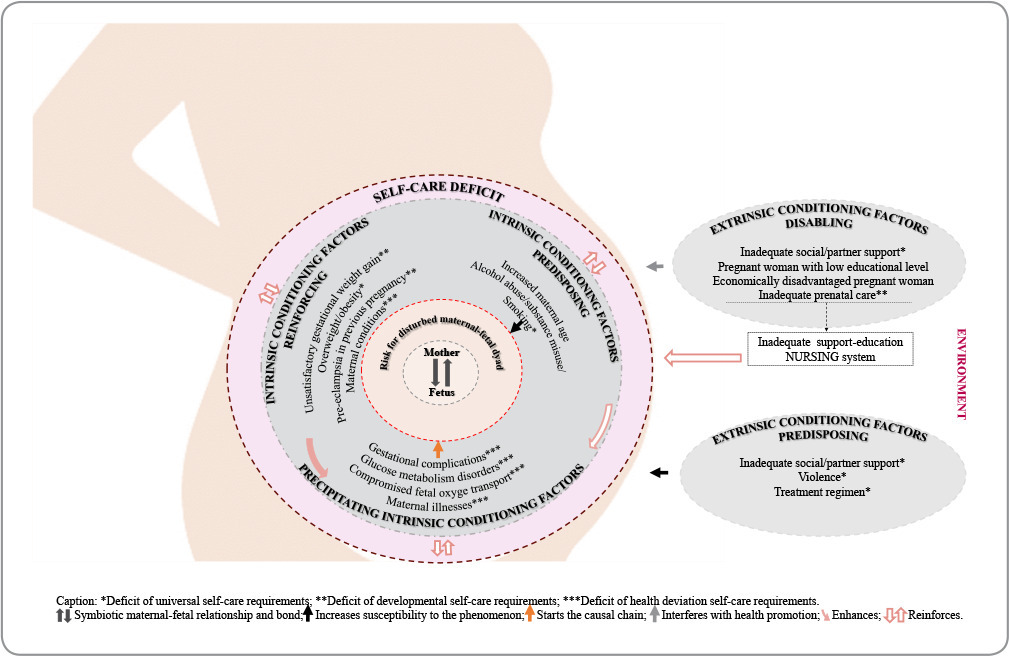
-
ORIGINAL ARTICLE07-29-2024
Family refusal of skin donation for transplantation: trends and associated factors
Revista Brasileira de Enfermagem. 2024;77(3):e20230209
Abstract
ORIGINAL ARTICLEFamily refusal of skin donation for transplantation: trends and associated factors
Revista Brasileira de Enfermagem. 2024;77(3):e20230209
DOI 10.1590/0034-7167-2023-0209
Views0See moreABSTRACT
Objectives:
to analyze the trends and factors associated with family refusal of skin donation for transplantation.
Methods:
this cross-sectional study was conducted in the State of São Paulo, with family authorization terms collected from 2001 to 2020. The variables analyzed included year, age, gender, cause of death, and type of institution. Data were analyzed using linear and multiple logistic regression, with the Odds Ratio estimated at p<0.05 for statistical significance.
Results:
1,355 individuals refused skin donation. The trend of refusals decreased between 2001 and 2009 in the age groups of 0-11 years and 12-19 years, but increased in the group aged ≥60 years. This trend continued to decrease in the 0-11 years group from 2010 to 2020, and increased in the 20-40 years group. Males and the age groups of 20-40 years, 41-59 years, and ≥60 years exhibited 27%, 34%, 47%, and 53% lower chances of refusal, respectively.
Conclusions:
there is an urgent need for measures to mitigate the high number of refusals associated with skin donation.
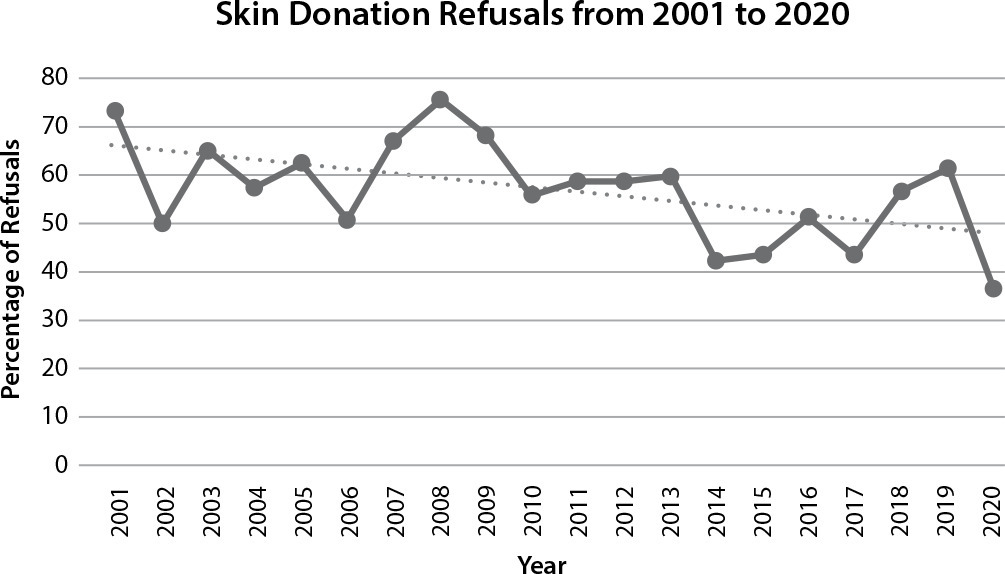
-
ORIGINAL ARTICLE07-29-2024
Primary Health Care in transitional care of people with stroke
Revista Brasileira de Enfermagem. 2024;77(3):e20230468
Abstract
ORIGINAL ARTICLEPrimary Health Care in transitional care of people with stroke
Revista Brasileira de Enfermagem. 2024;77(3):e20230468
DOI 10.1590/0034-7167-2024-0468
Views0See moreABSTRACT
Objectives:
to understand the role of Primary Health Care teams in caring for people with stroke after hospital discharge.
Methods:
single case study, with integrated units of analysis, with a qualitative approach. Data triangulation occurred through interviews with professionals and family caregivers involved in transition of care, in addition to direct observations in rounds and document analysis. For the analyses, the analytical strategies of theoretical propositions and construction of explanations were used, with the help of ATLAS.ti®.
Results:
the importance of counter-referral, the role of community health workers and the multidisciplinary team, health promotion, secondary prevention, home visits as a visceral attribute and nurses as care managers are evident.
Final Considerations:
the high demand on teams and the Social Determinants of Health interfere with adequate continuity of care. Transitional care programs that enable continuity of care are recommended.
-
ORIGINAL ARTICLE07-29-2024
Completeness of variables in Hospital-Based Cancer Registries for prostatic malignant neoplasm
Revista Brasileira de Enfermagem. 2024;77(3):e20230467
Abstract
ORIGINAL ARTICLECompleteness of variables in Hospital-Based Cancer Registries for prostatic malignant neoplasm
Revista Brasileira de Enfermagem. 2024;77(3):e20230467
DOI 10.1590/0034-7167-2023-0467
Views0See moreABSTRACT
Objectives:
to analyze the completeness of variables from Hospital-Based Cancer Registries of cases of prostate neoplasm in the Oncology Care Network of a Brazilian state between 2000 and 2020.
Methods:
an ecological time series study, based on secondary data on prostate cancer Hospital-Based Cancer Registries prostate. Data incompleteness was classified as excellent (<5%), good (between 5%-10%), fair (10%-20%), poor (20%-50%) and very poor (>50%), according to the percentage of lack of information.
Results:
there were 13,519 cases of prostate cancer in the Hospital-Based Cancer Registries analyzed. The variables “family history of cancer” (p<0.001), “alcoholism” (p<0.001), “smoking” (p<0.001), “TNM staging” (p<0.001) had a decreasing trend, while “clinical start of treatment” (p<0.001), “origin” (p=0.008) and “occupation” (p<0.001) indicated an increasing trend.
Conclusions:
most Hospital-Based Cancer Registries variables showed excellent completeness, but important variables had high percentages of incompleteness, such as TNM and clinical staging, in addition to alcoholism and smoking.
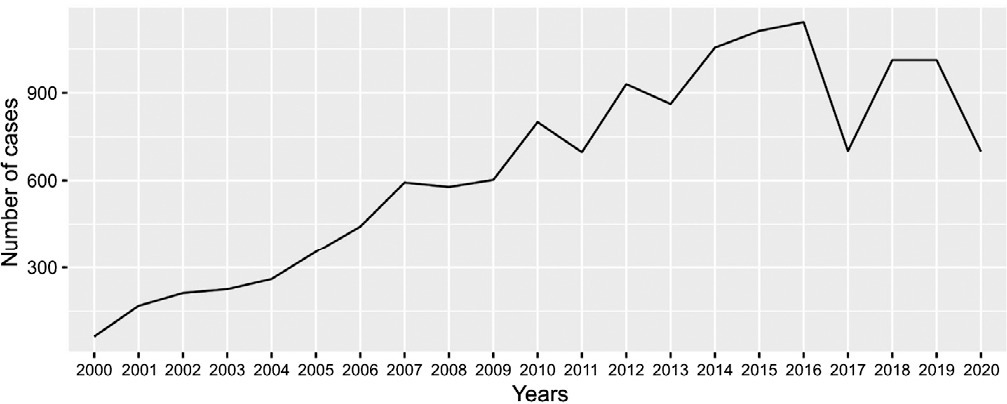
-
EXPERIENCE REPORT01-01-2017
Focus group on qualitative research: experience report
Revista Brasileira de Enfermagem. 2017;70(2):424-429
Abstract
EXPERIENCE REPORTFocus group on qualitative research: experience report
Revista Brasileira de Enfermagem. 2017;70(2):424-429
DOI 10.1590/0034-7167-2016-0091
Views1See moreABSTRACT
Objective:
to report the experience of applying the focus group technique for production of data in qualitative research.
Method:
four group sessions were held from May to June 2015, with the participation of professionals from the public sector of PHC and from specialized service.
Results:
the way focus group was developed is described in steps: planning, recruitment, ambience, group sessions, and evaluation.
Conclusion:
we highlight that the focus group, as a technique to produce data in collective space, can contribute not only to the construction of knowledge in Nursing, but also to the research approach with the assistance practice.

-
RESEARCH01-01-2017
Guide of attributes of the nurse’s political competence: a methodological study
Revista Brasileira de Enfermagem. 2017;70(3):526-534
Abstract
RESEARCHGuide of attributes of the nurse’s political competence: a methodological study
Revista Brasileira de Enfermagem. 2017;70(3):526-534
DOI 10.1590/0034-7167-2016-0483
Views0See moreABSTRACT
Objective:
To build and validate a guide of attributes of the nurse’s political competence.
Method:
Methodological research. This study comprised the construction of the instrument through literature review; experts validation of pre-established attributes for composing the guide; and clinical validation in the nurses work environment/reality. The data collection took place in the months from August to October 2014, and the analysis was based on the content analysis of Bardin and use of Epi info 3.5. All ethical precepts have been complied with.
Results:
From 29 attributes found in the literature, 25 have been validated by experts. Clinical/practical validation involved the participation of 43 nurses, who observed that the attributes are not articulated with the professional practices developed by them.
Conclusion:
The attributes of the nurse’s political competence were identified with support of literature. It is concluded that the professionals still have limited and fragmented perception of political competence, expressing difficulty/limitation.
-
ORIGINAL ARTICLE11-26-2022
Vulnerability and quality of life of older persons in the community in different situations of family care
Revista Brasileira de Enfermagem. 2022;75:e20210034
Abstract
ORIGINAL ARTICLEVulnerability and quality of life of older persons in the community in different situations of family care
Revista Brasileira de Enfermagem. 2022;75:e20210034
DOI 10.1590/0034-7167-2021-0034
Views0See moreABSTRACT
Objective:
to correlate socio-contextual aspects, physical vulnerability and quality of life of older persons in the community in different situations of family care.
Methods:
epidemiological, a cross-sectional and analytical study, with elderly people in the community (n=769), with application of the instruments: Vulnerable Elders Survey-13 (VES-13), World Health Organization Quality of Life for Older Persons (WHOQOL-OLD) and the World Health Organization Quality of Life (WHOQOL-BREF); and socio-contextual data questionnaire.
Results:
the population assessed presented an average of regular quality of life in both the WHOQOL-BREF and the WHOQOL-OLD. Older non-vulnerable persons (62.2%) and those with close family contact (82.6%) have a better quality of life than the vulnerable (p<0.0001).
Conclusion:
lower quality of life scores and more distant families are related to vulnerable elderly people; thus, the assessment of family proximity and physical vulnerability of older persons is shown to be an important factor in improving quality of life.
-
ORIGINAL ARTICLE10-09-2023
Independent and combined effects of lifestyle behaviors on adolescent health-related quality of life
Revista Brasileira de Enfermagem. 2023;76(4):e20220780
Abstract
ORIGINAL ARTICLEIndependent and combined effects of lifestyle behaviors on adolescent health-related quality of life
Revista Brasileira de Enfermagem. 2023;76(4):e20220780
DOI 10.1590/0034-7167-2022-0780
Views0See moreABSTRACT
Objective:
To investigate the independent and combined effects of lifestyle behaviors, including physical activity, sedentary behavior, sleep duration and food intake, in the health-related quality of life (HRQoL) of Brazilian adolescents.
Methods:
Cross-sectional school-based study, with the participation of 306 adolescents aged 14 to 18 years. A questionnaire was applied with structured questions to collect lifestyle behaviors data. Perception of the HRQoL was identified using the Kidscreen-27. The study used covariance analysis and linear regression models for statistical analysis.
Results:
Adolescents who reported ≤ 2 hours/day of screen-based sedentary behavior and sleep duration equivalent to 8-10 hours/night presented significantly higher HRQoL. Adolescents who reported joint adherence ≥ 3 healthy lifestyle behaviors demonstrated approximately two [OR=2.12] to three times [OR=3.04] more chance of presenting higher perceptions of HRQoL.
Conclusion:
Although healthy lifestyle behaviors had a positive independent effect on HRQoL, joint adherence to healthy behaviors enhances the cumulative effect.

-
ORIGINAL ARTICLE12-04-2023
Social representation of spiritual surgeries in Umbanda: culture, religion and contributions of nursing theory
Revista Brasileira de Enfermagem. 2023;76(6):e20220787
Abstract
ORIGINAL ARTICLESocial representation of spiritual surgeries in Umbanda: culture, religion and contributions of nursing theory
Revista Brasileira de Enfermagem. 2023;76(6):e20220787
DOI 10.1590/0034-7167-2022-0787
Views1See moreABSTRACT
Objective:
to analyze the social representation of spiritual surgeries in Umbanda for Bantu-Amerindian ritual mediums and their contributions to the cross-cultural care proposed by Madeleine Leininger.
Methods:
a descriptive-exploratory, qualitative study, supported by the procedural approach of Social Representation Theory and Transcultural Nursing Theory, carried out with 30 Umbanda mediums of the Bantu-Amerindian ritual through interviews, submitted to the Iramuteq software for lexical analysis.
Results:
mostly women, white, with an average of 46 years old and approximately 14 years of practice in Umbanda participated. The social representation of spiritual surgeries in Umbanda is objectified and anchored through a biomedical vision of care, encompassing a set of beliefs, values and practices as religious treatments, through faith, whose main objective is healing.
Final considerations:
spiritual surgeries are a form of transcultural care, according to Madeleine Leininger’s propositions, as they integrate the culture of a group through health care in Umbanda.

-
ORIGINAL ARTICLE05-29-2023
Quality of life from women’s perspective in the exercise of sex work: a study of social representations
Revista Brasileira de Enfermagem. 2023;76:e20220169
Abstract
ORIGINAL ARTICLEQuality of life from women’s perspective in the exercise of sex work: a study of social representations
Revista Brasileira de Enfermagem. 2023;76:e20220169
DOI 10.1590/0034-7167-2022-0169
Views1See moreABSTRACT
Objectives:
to analyze the social representations elaborated by sex workers from Alto Sertão Produtivo Baiano about quality of life.
Methods:
a qualitative study, based on the Social Representation Theory, carried out in the region of Alto Sertão Produtivo Baiano, with 30 sex workers. Individual in-depth interview was carried out, with speeches organized in a corpus and treated in IRAMUTEQ, enabling lexical analysis for Descending Hierarchical Classification.
Results:
four thematic classes emerged, in which social representations of quality of life pervade: money earned to supply needs; association with healthy living and obtaining health (physical and mental); balance of emotions (although there are some negative sensations such as fear and anxiety); and faith in a deity.
Final Considerations:
the social representations elaborated by sex workers about quality of life are anchored in concepts, subjective and practical, punctuated by the World Health Organization.

-
ORIGINAL ARTICLE05-29-2023
Violence in rural areas against disabled people from the perspective of their families
Revista Brasileira de Enfermagem. 2023;76:e20220404
Abstract
ORIGINAL ARTICLEViolence in rural areas against disabled people from the perspective of their families
Revista Brasileira de Enfermagem. 2023;76:e20220404
DOI 10.1590/0034-7167-2022-0404
Views0See moreABSTRACT
Objectives:
to know the violence spoken and felt by disabled people, living in rural areas, from the perspective of their families.
Methods:
a descriptive-exploratory and qualitative study, carried out in four municipalities in Rio Grande do Sul, Brazil. Twelve family members who lived with disabled people in rural areas participated. Data were collected through semi-structured interviews and analyzed using thematic content analysis.
Results:
disabled people, living in rural areas, experienced physical, psychological and sexual violence, perpetrated by family members, colleagues, community members and health professionals. Adaptations were mentioned in family dynamics for the care of disabled people, social, financial and leisure impacts, and challenges in access and accessibility to education and health services.
Final Considerations:
violence against this population manifests itself in a reality with socioeconomic and family particularities, marked by exclusion, disrespect and denial of rights and access to fundamental goods and services.

-
ORIGINAL ARTICLE12-08-2023
Care for older adults with disabilities in Long Term Care Facility
Revista Brasileira de Enfermagem. 2023;76:e20220767
Abstract
ORIGINAL ARTICLECare for older adults with disabilities in Long Term Care Facility
Revista Brasileira de Enfermagem. 2023;76:e20220767
DOI 10.1590/0034-7167-2022-0767
Views0See moreABSTRACT
Objective:
to analyze the constitution of care offered to older adults with disabilities, from Long Term Care Facility professionals’ perspective.
Methods:
this is a discourse analysis based on the post-structuralist framework. Participants in this study are professionals involved in the care for older adults, totaling 14 respondents, 13 women and one man.
Results:
from professionals’ perspective, there is a fine line between caring for older adults with disabilities and maintaining their autonomy. Care in which autonomy is restricted predisposes older adults to a process of dependency.
Final considerations:
caring for older adults with disabilities constitutes the challenge between caring and maintaining independence. Thus, older adult-centered care should be taken as a premise so that their individualities are respected.
-
02-08-2021
Elder abuse: actions and suggestions by Primary Health Care professionals
Revista Brasileira de Enfermagem. 2021;74:e20200263
Abstract
Elder abuse: actions and suggestions by Primary Health Care professionals
Revista Brasileira de Enfermagem. 2021;74:e20200263
DOI 10.1590/0034-7167-2020-0263
Views0See moreABSTRACT
Objective:
to analyze the actions and suggestions of Primary Care professionals in relation to elder abuse.
Method:
this is a research with a qualitative approach based on the realization of focus groups with professionals from Primary Health Care in a city in the interior of São Paulo. The methodological stance of Hermeneutic-Dialectic thinking (HD) was adopted.
Results:
two themes were listed: Actions taken by health professionals and Suggestions for improving care for elderly victims of violence.
Final considerations:
professionals emphasized the need to implement new resources and improve the functioning of existing ones, so that comprehensive care is possible, in order to prevent and intervene in the important social and public health problem that violence represents.
-
05-21-2021
Influence of chronic pain on cognitive performance in elderly caregivers: a longitudinal study
Revista Brasileira de Enfermagem. 2021;74:e20200412
Abstract
Influence of chronic pain on cognitive performance in elderly caregivers: a longitudinal study
Revista Brasileira de Enfermagem. 2021;74:e20200412
DOI 10.1590/0034-7167-2020-0412
Views0See moreABSTRACT
Objective:
to compare cognitive performance of elderly caregivers with and without chronic pain over four years and verify the effect of pain intensity on cognitive performance of elderly caregivers with chronic pain.
Method:
a longitudinal study with data collected in 2014 and 2018. Community-dwelling elderly caregivers of a Brazilian city participated in the study. Cognition was assessed using the Addenbrooke’s Cognitive Examination instrument. Pain was assessed by an 11-point scale. For data analysis, a mixed linear model and ANCOVA with a 5% significance level were used.
Results:
they were divided into two groups. A cognitive decline over four years was found in elderly people with pain (p=0.02; 95%CI=0.32-4.25), while those without pain did not show a significant change.
Conclusion:
the results show that elderly caregivers with pain had a worse cognitive performance, but when comparing groups with the ANCOVA test for intergroup analysis, there was no difference in cognitive performance.
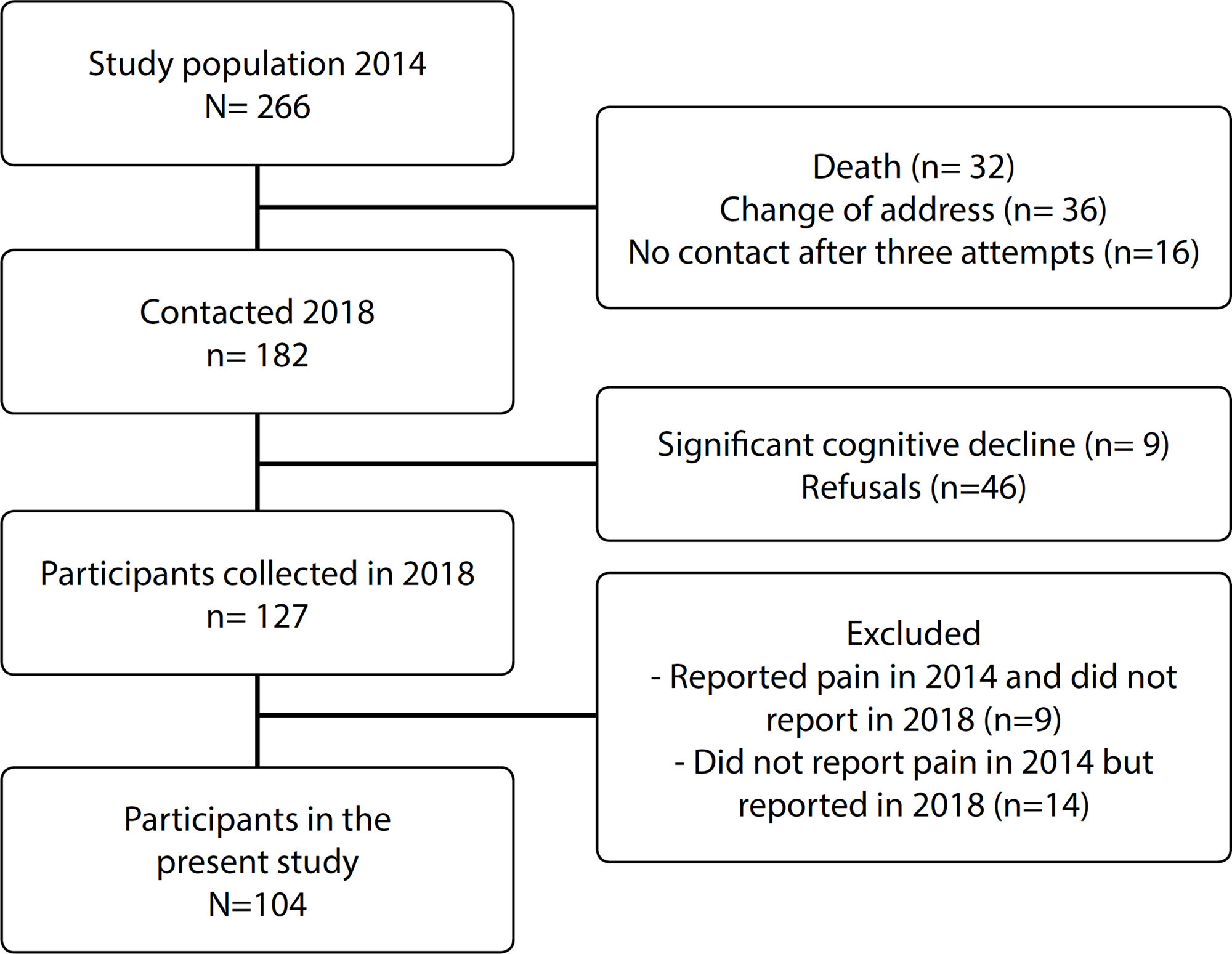
-
ORIGINAL ARTICLE12-21-2020
Comprehensive care from the perspective of nurses: an ecosystem approach
Revista Brasileira de Enfermagem. 2020;73:e20190781
Abstract
ORIGINAL ARTICLEComprehensive care from the perspective of nurses: an ecosystem approach
Revista Brasileira de Enfermagem. 2020;73:e20190781
DOI 10.1590/0034-7167-2019-0781
Views1See moreABSTRACT
Objectives:
to verify nurses’ perceptions about comprehensive care to human beings from the ecosystem perspective, with Therapeutic Touch use.
Methods:
an exploratory-descriptive, qualitative study, conducted with 11 nurses who use/used Therapeutic Touch in daily work. Data were collected through online semi-structured interviews and submitted to discursive textual analysis. The ecosystem framework was used.
Results:
participants talked about the theme in a polysemic way, but understand that comprehensive care is associated with nursing professionals and intrinsic in their being and doing, considering the philosophical theoretical bases of nursing, which aim at the comprehensiveness of being.
Final Considerations:
Therapeutic Touch was considered as a way to achieve comprehensive care caring to human being ins. The objective of the study was achieved; however, it is understood the need for other research to advance this knowledge and enable innovations in professional practice of nurses.
-
02-12-2021
(Lack of) oral hygiene care for hospitalized elderly patients
Revista Brasileira de Enfermagem. 2021;74:e20200415
Abstract
(Lack of) oral hygiene care for hospitalized elderly patients
Revista Brasileira de Enfermagem. 2021;74:e20200415
DOI 10.1590/0034-7167-2020-0415
Views0See moreABSTRACT
Objective:
to analyze the oral hygiene care for hospitalized elderly patients provided by the nursing staff.
Method:
this is a qualitative, exploratory-descriptive study carried out in a university hospital, with the participation of 35 professionals from the nursing staff. Data collection was carried out through semi-structured interviews, explored through thematic content analysis.
Results:
two categories emerged: The oral hygiene of hospitalized elderly patients as an extension of body care and Barriers in (lack of) care with the oral hygiene of hospitalized elderly patients, with two subcategories: The oral hygiene and dental prosthesis technique performed divergently; Care hampered by deficit of materials and human resources.
Final considerations:
this study showed weaknesses in the oral hygiene care of hospitalized elderly patients, promoting reflections on the practice informed in data and management actions, allowing recommendations of care standards for the nursing staff.
-
ORIGINAL ARTICLE12-21-2020
Terms of specialized nursing language for chronic renal patients undergoing conservative treatment
Revista Brasileira de Enfermagem. 2020;73:e20190820
Abstract
ORIGINAL ARTICLETerms of specialized nursing language for chronic renal patients undergoing conservative treatment
Revista Brasileira de Enfermagem. 2020;73:e20190820
DOI 10.1590/0034-7167-2019-0820
Views0See moreABSTRACT
Objectives:
to validate the terms of the specialized nursing language used in the care of people with chronic kidney disease undergoing conservative treatment identified in the literature by mapping them with terms of the International Classification for Nursing Practice, version 2019, and representing them by means of a mandala.
Methods:
descriptive, documentary and methodological study. The terms were collected in 53 scientific articles, standardized and mapped with the terminology. The validation was performed by six nurses through a focus group. The Content Validity Index was used and terms with a value ≥ 0.80 were validated.
Results:
the normalization resulted in 957 relevant terms, of which 499 were constant and 458 not included in the terminology. Terms were validated when Content Validity Index was between 0.86 and 1.0.
Conclusions:
the study allowed the validation of terms that will contribute to unify the professional language of nursing in the care of people with chronic kidney disease.

-
05-21-2021
Factors associated with quality of life of older adults with chronic pain
Revista Brasileira de Enfermagem. 2021;74:e20200554
Abstract
Factors associated with quality of life of older adults with chronic pain
Revista Brasileira de Enfermagem. 2021;74:e20200554
DOI 10.1590/0034-7167-2020-0554
Views0See moreABSTRACT
Objective:
To analyze the factors associated with quality of life of the older adults with chronic pain.
Method:
Cross-sectional study conducted with 239 older adults in outpatient care in the state of Goiás, Brazil. The World Health Organization Quality of Life–Old (WHOQOL-OLD) instrument contains six domains and was applied to assess quality of life. Simple and multiple linear regressions were used in the statistical analysis.
Results:
The factors associated with Sensory Abilities were age (β = – 0.52), time spent together (β = – 14.35; – 17.86; – 15.57), and pain intensity (β = – 1, 70). Autonomy was associated with depression (β = – 5.99) and chest pain (β = – 6.17). Social participation related to schooling (β = – 0.64), diabetes mellitus (β = – 8.15), depression (β = – 14.53), pain intensity (β = – 1.43), and lower limb pain (β = – 5.94). Past, present and future activities related to depression (β = – 6.94). Death and dying related to hypertension (β = – 8.40), while Intimacy to depression (β = – 5.99) and headache/face pain (β = – 3.19).
Conclusion:
The time experiencing chronic pain and the location of this experience, as well as depression, diabetes and systemic arterial hypertension were factors that had greater influence on the older adult’s Quality of Life domains.
-
REVIEW09-06-2022
Religiosity and mental health as aspects of comprehensiveness in care
Revista Brasileira de Enfermagem. 2022;75(1):e20201011
Abstract
REVIEWReligiosity and mental health as aspects of comprehensiveness in care
Revista Brasileira de Enfermagem. 2022;75(1):e20201011
DOI 10.1590/0034-7167-2020-1011
Views0See moreABSTRACT
Objective:
to understand how religiosity can influence the health of individuals diagnosed with mental disorders, based on comprehensive care.
Methods:
this is an integrative literature review, with the inclusion of articles in Portuguese, English and Spanish, between 2010 and 2018.
Results:
the critical analysis and qualitative synthesis of the 24 selected studies were categorized into two subtopics: The influence of religiosity in promoting comprehensive mental health care; Mental health versus religiosity: influencing conditions for effective access to comprehensive care.
Final considerations:
a positive influence of religiosity was identified in the lives of individuals diagnosed with mental disorders; however, evidence shows that health teams do not feel comfortable and prepared to work with religiosity as an expression of spirituality. This being one of the dimensional aspects of health, it can be inferred, on the results, the existence of this gap in the comprehensive care approach.
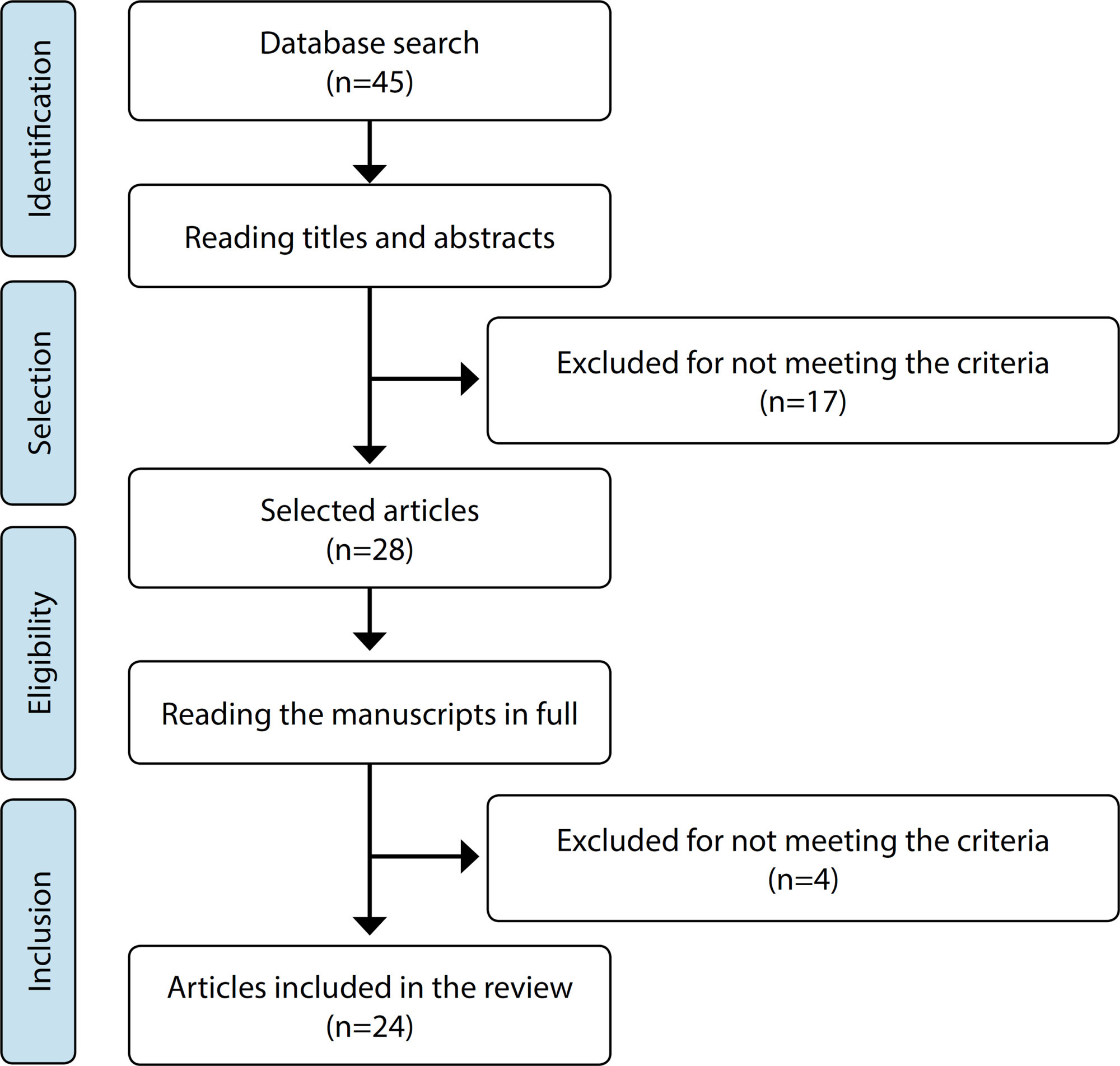
-
ORIGINAL ARTICLE05-03-2021
Implementation of a surgical safety checklist in Brazil: cross-sectional study
Revista Brasileira de Enfermagem. 2021;74(2):e20190874
Abstract
ORIGINAL ARTICLEImplementation of a surgical safety checklist in Brazil: cross-sectional study
Revista Brasileira de Enfermagem. 2021;74(2):e20190874
DOI 10.1590/0034-7167-2019-0874
Views0See moreABSTRACT
Objective:
to identify the implementation process of the World Health Organization Surgical Safety Checklist in Brazilian hospitals.
Methods:
this is a cross-sectional study with 531 participants during a Congress of Perioperative Nursing, promoted by the Brazilian Association of Operating Room Nurses, Anesthetic Recovery and Material and Sterilization Center, in 2017.
Results:
among the nursing professionals included, 84.27% reported the checklist implementation in the workplace. Regarding daily application in the Sign-in stage, 79.65% of professionals confirmed patient identification with two indicators; in the Time-out stage, 51.36% of surgeries started regardless of confirmation of one of the items. In the Sign-out stage, 69.34% of professionals did not count or occasionally counted the surgical instruments and suture needles, and only 36.36% reviewed concerns about postoperative recovery.
Conclusion:
this study identified needs for improvements in applying the checklist in the Brazilian reality, to guarantee safer surgical procedures.
Search
Search in:
Nuvem de Tags
Adolescente (85) Atenção Primária à Saúde (239) COVID-19 (91) Criança (91) Cuidados de Enfermagem (269) Educação em Enfermagem (151) Educação em Saúde (139) Enfermagem (930) Enfermagem Pediátrica (86) Estudantes de Enfermagem (77) Estudos de Validação (131) Família (87) Idoso (208) Promoção da Saúde (99) Qualidade de Vida (104) Saúde do Trabalhador (86) Saúde Mental (145) Saúde Pública (82) Segurança do Paciente (150) Tecnologia Educacional (100)



